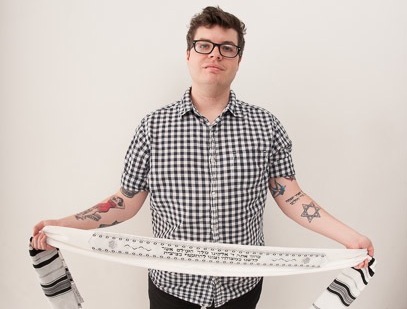
In Judaism, we have a custom of saying three, daily prayers: morning, afternoon and evening. As a progressive Jew, I have taken this to mean that at different times in the day, we have to pause to reflect on the fact that, thank God, we are still here and are able to live fully in this moment.
I was never a morning person until recently. I had spent my entire life staying up late, hacking away on my computer, reading, or more often, working on my musical career. For a long time, I didn’t go to bed until 2AM at the earliest. When I entered the 9-to-5 world, my body realigned with decent society and I discovered that mornings were a true blessing.
This new passion for the spiritual potential of morning time lead me to re-imagine what shacharit, the morning prayer service, was about. And for me, it was all about coffee.
Drinking coffee is as universal as religion. For some of us, it practically is a religion! Rituals like drinking coffee are not just about pleasure, but living out a sacred story. What story are you “living” in your morning? Is it the story of a frantic workday? Is it the story of raising children, or taking care of an aging parent? Is it the story of a first job, the start of school or some other milestone? Or perhaps it’s another story? I ask myself this question every day.
Unfortunately, our actions are often mindless. We find ourselves on “autopilot”, simply getting through the day, moving from one task to another. This is surviving, not thriving. And you deserve better than that.
Judaism has two great tools to push against our natural urge to survive instead of thrive. These tools are called kavanot and keva, intention and order. These tools, alongside your favorite blend of coffee, make for a shacharit meditation that bring kedushah, holiness, into our lives.
Setting Your Intentions
Before you sit with your coffee, set your intentions for the day. Allow the aroma of the drink to inspire you toward acts of holiness.
Inspired by a teaching I learned from my colleague Rabbi Andrew Hahn (aka Kirtan Rabbi), I take a moment to set my intentions.
Perhaps today you choose to be fully present. Or maybe you choose today to be a time for forgiveness. Today may be the first day of the rest of your life, or a chance at expressing gratitude.
Setting your kavanot is not about accomplishment. You are not setting goals: you are setting a frame of mind. Choose no more than three intentions for the day. Ideally, just one.
From these intentions, we can build a keva (order) of spiritual practice, rooted in mindfulness. Go make your coffee!
Keva: the Order
Now that you have set your intentions for the day, it is time to begin the ritual aspect of your spiritual practice. This is often the hardest part for people: while we can lose ourselves in the abstract idea of meditation, the freewheeling, hippy-dippy, no limits portion of a spirituality, we often get hung up on the rituals and words of faith. It’s where we start to dip our toes into the waters of organized religion, and all too often we turn away with feelings of coldness.
It’s in this space that you should choose one reading, prayer, mantra or meditation. Something that is meaningful to you, but does not come from you.
I am often asked why we Jews need a prayer book, when our theology teaches that we can talk to God in any way at any time. The reality is that the written word has power. In Judaism, the word for words also means things. Words have a tangible nature. And when they come from someone else, a spiritual mentor who we never knew and past away long before us, we are able to connect their devarim, their words, to what makes us substantial…our “stuffness”, if you will (yes, stuffness isn’t a word, but go with me on this one).
Another way of looking at it comes from the sermon of Unitarian Universalist minister Rev. Marlin Lavanhar who said, “finding our way to the ‘other side’ is less treacherous when we learn and listen to those who have traveled before and know something about the route…teachers whose living was and remains a testament to the sacred dimensions of being human.”
To put it another way, as a consumer advocate and travel expert once said, “the best journeys are the ones we do with those we love.”
Finding a text that is not us, perhaps a text that runs contrary to our everyday understanding of the world, helps us to move past ourselves; to take a journey to the destination we never knew we always wanted to be.
Back To Coffee…
Once you find your words of spiritual invigoration, read them to yourself, perhaps meditate for a moment, and take your first sip of coffee.
As you do, recognize something amazing: that is took billions of years, and countless people, to bring you to this experience. From the good Earth that brought forth the coffee bush, to the tired, worn out hands that moved the beans from crop to bulk commodity. From the roaster whose careful attention brought out the oils and aromas of the coffee, to the cashier who stood at the checkout counter just so you could buy a bag. To the entire process, and to all processes, that bring us to moments like these.
In your morning moments when there is peace, cultivate a God-centered peace in your heart and drink in your spiritual potential.
May you have shalom and simcha, peace and joy.














